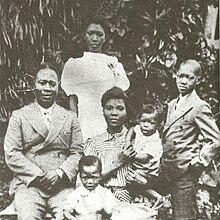The Ransome-Kuti family is a Nigerian Yoruba political family noted for its simultaneous contributions to art, religion, education and medicine. It belongs to the Nigerian bourgeoisie, and also has historic links to the Nigerian chieftaincy system.
| Ransome-Kuti | |
|---|---|
| Nigerian political family | |
 Ransome-Kuti family c.1940 | |
| Parent house | Oodua |
| Current region | Yorubaland |
| Place of origin | Orile Igbein, Egba Forest |
| Founded | 1830 |
| Founder | Likoye Kuti |
| Titles | |
| Connected families | Jibolu-Taiwo family Soyinka family |
| Distinctions | Nobel Prize for Literature Lenin Peace Prize Commander of the Order of the Federal Republic Member of the Order of the Niger |
History
editThe first member to bear the name Ransome, the Reverend Josiah Jesse "J.J." Ransome-Kuti, adopted it in honour of the Anglican missionary who had first converted his family to Christianity.[1] He followed his father Likoye Kuti — an Egba griot — into the musical vocation, and wrote a series of popular hymns in the Yoruba language while serving as an Anglican cleric.
The descendants of J.J.'s son, the Reverend Israel Oludotun Ransome-Kuti, and Chief Funmilayo Ransome-Kuti include a health minister (who had also served as a university professor), a political activist (who would himself later be adopted as an Amnesty International prisoner of conscience), and six further musicians (including one who founded and led a political party and three Grammy Award nominees).
The Ransome-Kutis have been known to form marital unions with other families of the Yoruba elite: the branch descended from Chief Funmilayo Ransome-Kuti is a sept of the aristocratic Jibolu-Taiwo family of Egbaland by virtue of its descent from her, while the one descended from the Reverend Samuel Ayodele Soyinka, the husband of Grace Eniola Jenkins-Harrison, is related to the royal family of Isara-Remo through him.
In 2017, in Abeokuta, the house on NEPA Road where the family of Israel and Funmilayo Ransome-Kuti lived was transformed into the Ransome-Kuti Museum, dedicated to the history of the family. [2]
Family tree
edit- Olasu (c. 1750–c. 1820)
- Jamo (c.1785–c.1850) m. Orukoloku (c.1795–c.1870)
- Likoye Kuti (c.1820–c.1863) m. Anne Ekidan Efupeyin (c. 1830–July 1877)
- Eruwe Lousia Kuti (c.1857–19??)
- Josiah Jesse Ransome-Kuti (1855–1930), clergyman and the first person to use the double-barrelled family name, m. Bertha Erinade Anny Olubi (1862–1934)
- Josiah Oluyinka Ransome Kuti (1883–c.1960)
- Anne Lape Iyabode Ransome-Kuti (1885–c.1960)
- Grace Eniola Jenkins-Harrison (1908–1983) (Grace Eniola Soyinka) m. Samuel Ayodele Soyinka
- Akinwande Oluwole Babatunde Soyinka (1934) (Wole Soyinka), writer, among others
- Grace Eniola Jenkins-Harrison (1908–1983) (Grace Eniola Soyinka) m. Samuel Ayodele Soyinka
- Olufela Daniel Ransome-Kuti (1887–1887)
- Israel Oludotun Ransome-Kuti (1891–1955), clergyman, m. Frances Abigail Olufunmilayo Thomas (1900–1978) (Funmilayo Ransome-Kuti), political activist
- Olikoye Ransome-Kuti (1927–2003), doctor
- Olufela Olusegun Oludotun Ransome-Kuti (1938–1997) (Fela Kuti), musician, m. Remilekun Taylor, among others[3]
- Omoyeni Anikulapo Kuti, (b. 1961) (Yeni Kuti), dancer, m. Femi Segun
- Rolari Segun (b. 1988)
- Olufela Olufemi Anikulapo Kuti, (b. 1962) (Femi Kuti), musician, m. Funke Kuti, dancer/music manager (now divorced)
- Omorinmade Anikulapo Kuti, (b. 1995) (Made Kuti), musician
- Sola Anikulapo Kuti, (1963–1997), dancer
- Kunle Anikulapo Kuti, (b. circa 1971), folk singer, m . Olufunmilayo Hastrup (b. 1964)
- Omosalewa Anikulapo Kuti, lawyer, m. Fehintola (1958–2006)
- Oluseun Anikulapo Kuti, (b. 1982) (Seun Kuti), musician
- Motunrayo Anikulapo Kuti, (b. 1980), dancer
- Omoyeni Anikulapo Kuti, (b. 1961) (Yeni Kuti), dancer, m. Femi Segun
- Bekolari Ransome-Kuti (1940–2006), (Beko Ransome-Kuti), doctor and political activist
- Enitan Ransome-Kuti, Nigerian Army officer
- Dolupo Ransome-Kuti (1922–2010)
- Frances Kuboye (d. 1997), dentist/jazz singer
- Joshua Oluremi Ransome-Kuti (1894–c. 1970)
- Susannah Olubade (1898–1898)
- Victoria Susannah Tinuade Ransome-Kuti (1899–1980)
- Azariah Olusegun Orisale Ransome-Kuti (1902–1979)
- Yemisi Ransome-Kuti (1947), current chief of the family
- Olusegun Bucknor
- Bola Soyemi
- Oluwaseun Olasupo Soyemi
- Eniola Anuoluwapo Mofoluwaso Soyemi[4]
- Yemisi Ransome-Kuti (1947), current chief of the family
- Likoye Kuti (c.1820–c.1863) m. Anne Ekidan Efupeyin (c. 1830–July 1877)
- Jamo (c.1785–c.1850) m. Orukoloku (c.1795–c.1870)
See also
editReferences
edit- ^ Sasom, Ian. "Great Dynasties: The Ransome-Kutis". The Guardian.
- ^ "Fela's family house: Transforming from Kuti's home to 'Heritage Museum'". The Sun Nigeria. 9 November 2017. Retrieved 6 April 2024.
- ^ Veal, Michael (2000). Fela : Life and Times of an African. Philadelphia, Pennsylvania: Temple University Press. ISBN 978-1-4399-0768-9. OCLC 1122451119.
- ^ "Eniola Anuoluwapo Soyemi". the Guardian. Retrieved 17 April 2021.
Further reading
edit- Gibbs, James (1988). "Biography into Autobiography: Wole Soyinka and the Relatives Who Inhabit 'Ake'". The Journal of Modern African Studies. 26 (3): 517–548. doi:10.1017/S0022278X00011757. JSTOR 160896.
- Johnson-Odim, Cheryl; Nina Emma Mba (1997). For Women and the Nation: Funmilayo Ransome-Kuti of Nigeria. Urbana and Chicago: University of Illinois Press. ISBN 9780252066139.
- Fargion, Janet Topp (12 January 2016). "The Ransome-Kuti Dynasty". The British Library. Retrieved 18 October 2018.
External links
edit- The Shrine The unofficial website for Fela Kuti and Afrobeat Music, with biographies of Fela, Femi and Seun Kuti.